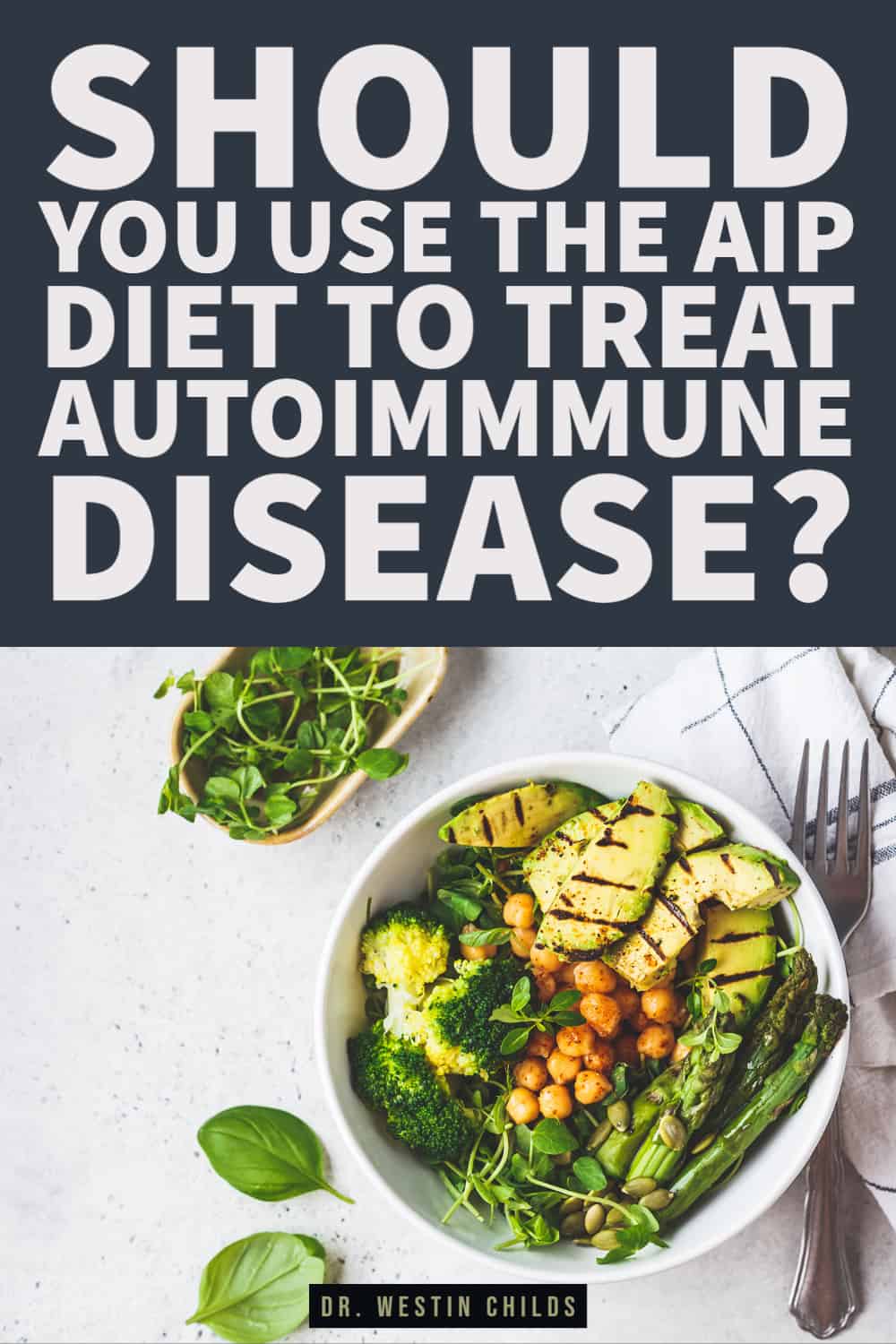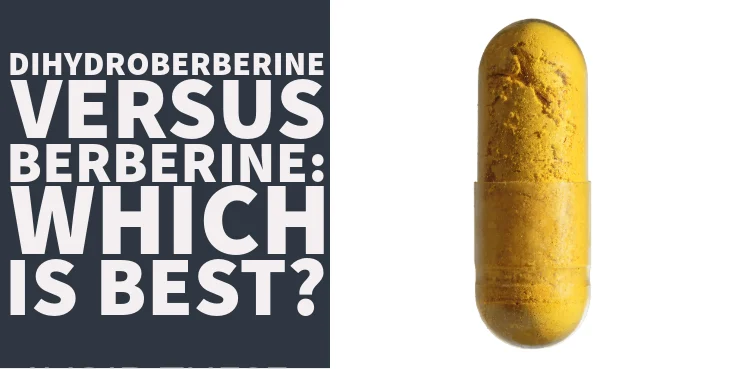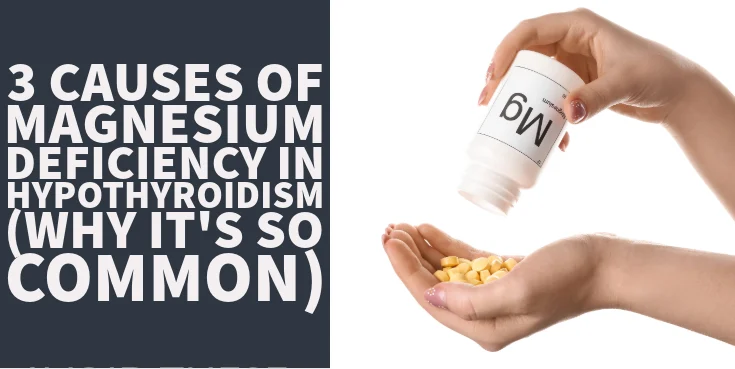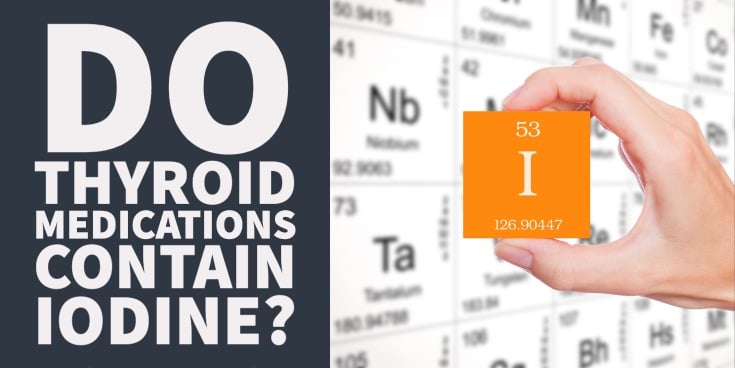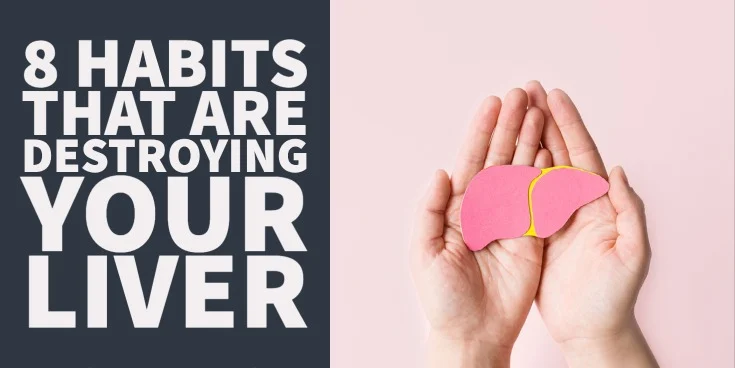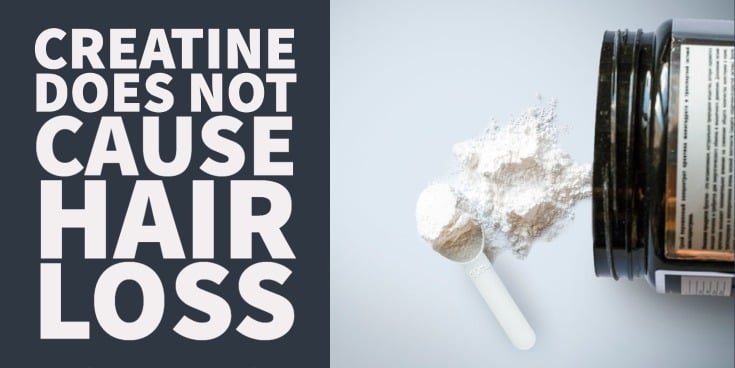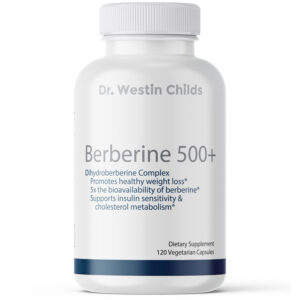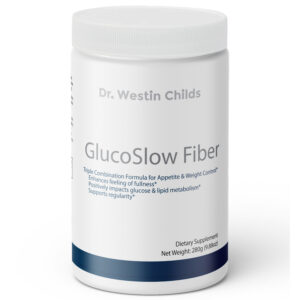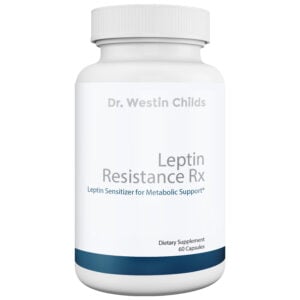Is the AIP diet the one thing you are missing from finally taking control of your autoimmune disease?
It turns out that there are probably better options for you and some things that you should seriously consider before using this diet.
Like other diets, it can actually cause more problems than it can help.
Use this guide to determine if the AIP diet will be helpful in YOUR specific case and what to do before you start the diet:
What is the AIP Diet & Is it Safe?
The AIP diet stands for the autoimmune protocol diet.
It is a very restrictive diet that was designed to help improve GI functioning while reducing both autoimmunity and inflammation.
The basic premise of the diet is to remove all potential inflammatory or immunogenic sources from food.
As a result, the diet is basically a more strict version of the paleo diet.
Remember that the majority of problems relating to autoimmunity likely stem from the GI tract (1) and the influence of certain bacteria populations and the influence of environmental factors:
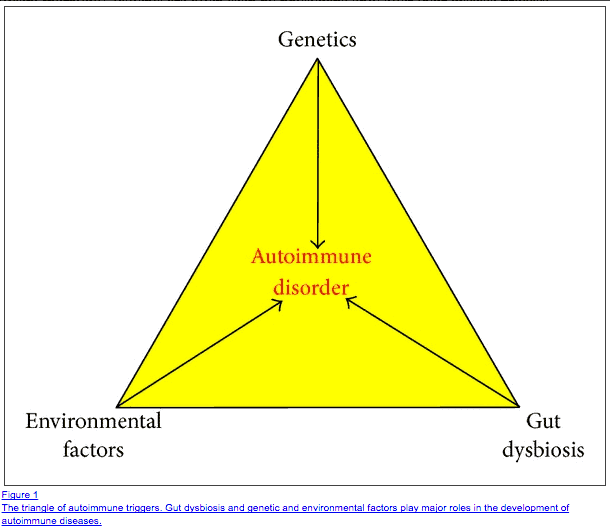
The goal of changing your diet is directed towards improving this cascade, improving GI function, and reducing inflammation which should theoretically lead to an improvement in immune function and a reduction in your autoimmune symptoms.
But the main question here is this:
Is the AIP diet safe and should you actually use this diet?
Like most subjects I cover, there really isn’t an easy answer (unfortunately).
And like most topics, it really depends on YOU.
But I have to say that in a general sense not all patients need to use the AIP diet. In fact, I would suggest that most patients are probably fine not using this diet provided they go through the topics listed below.
In addition, there are several subsets of patients who might actually do worse on the AIP diet.
Let’s talk about the potential pitfalls of the AIP diet and why it may be harmful to certain people:
- May result in unwarranted calorie restriction leading to worsening metabolism
- May cause intolerances to foods if used long-term (oral tolerance)
- Difficult to adhere to long term for some people
- Difficult to manage macromolecules for certain hormone imbalances (leptin resistance)
- If not done correctly may result in nutrient deficiencies
- It may NOT improve your autoimmune disease unless underlying factors are also addressed (infections, nutrient deficiencies, hormone imbalances, etc.)
This list might not make sense until you dig a little bit deeper…
Consideration before going on the AIP Diet
Before you consider using the AIP diet I recommend that you take a personal inventory of this entire list and make any changes necessary.
If you’ve already done every part of this list then you should consider using the AIP diet, but most of you will still find areas that you can improve upon first.
#1. Clean up your existing diet FIRST
Before going on the AIP diet you should absolutely evaluate your existing diet to see if you can improve upon it first.
Most patients can dramatically improve GI function and boost their immune system by making basic changes.
While the AIP diet definitely can help lower antibody levels it’s been my experience that sometimes the change from a “regular” diet to the AIP diet results in reduced adherence and therefore the benefits are only temporary.
Why?
Probably because the AIP diet is so strict.
Your goal should be to make a change that you can STICK with, something that will result in a long-term improvement to your immune function.
Assuming you haven’t made these changes to your diet already, you should attempt these changes first.
How to clean up your existing diet:
- Remove all sources of added sugar (hopefully, you’ve done this already, but make sure you look at the ingredient list of all foods you may be eating to look for hidden sugars)
- Remove ALL processed foods (this means no food with more than 1-2 ingredients, you should be able to pronounce and identify all of the foods in any given meal)
- Stop eating industrial seed oils or inflammatory oils and fats (these fats are cheap and can be found even in “healthy” versions of foods like protein bars and gluten-free/dairy-free quick snacks)
- Stop consuming artificial sweeteners altogether
- Avoid soft drinks, soda, energy drinks, and cheaper teas (use herbal teas or high-quality teas instead)
- Avoid condiments like ketchup, pre-made salad dressing, etc.
- Add in some version of fermented food at least 2-3x per week (something like kefir, coconut kefir, kombucha, or sour kraut)
- Avoid healthy versions of unhealthy food (protein bars, most pre-made protein shakes, low-fat anything, etc.)
- Stop eating out (at least 60 days) and make ALL of your meals
- Actively avoid gluten and liquid dairy products
- Stick to a whole food-based diet (whole 30 or paleo-esque)

This list might seem like a lot but it’s actually MUCH less restrictive than the AIP dietary guidelines.
Most people if they follow the outline listed above AND get tested for food sensitivities (listed below) will notice a significant improvement in their symptoms.
#2. Get tested for food sensitivities & for gluten antibodies
Another step I often see missed by patients is the testing for food sensitivities.
Undiagnosed or missed food sensitivities can promote chronic low-grade inflammation in the GI tract which can increase permeability leading to a leaky gut and increasing your risk of developing autoimmunity through molecular mimicry.
When I say food sensitivities I am not referring to true allergies.
Instead, you need to consider that your body may simply not tolerate certain foods or certain food groups due to inflammation from your current diet.
It’s critical to find out which foods may be triggering this problem and ELIMINATE it.
You can do this by undergoing a delayed IgG sensitivity test through your serum.
This test will help pick up IgG antibodies to various food groups which can help identify which foods you are reacting to.
This type of sensitivity should be differentiated from skin “prick” testing which looks for IgE antibodies to certain foods.

The delayed IgG sensitivity test is more accurate than the skin test for various reasons and should be the test of choice.
Another seemingly obvious test is the test for gluten antibodies.
I continually pick up 2-3 people every month with antibodies to gluten via lab testing.
The problem with gluten sensitivity is that the majority of the symptoms may be EXTRA INTESTINAL meaning away from the intestines.
This means that you might be reacting to gluten and presenting with symptoms like depression, changes to your mood, irritability, rashes, reduced immune system, etc.
For this reason, it’s very important to get evaluated for antibodies to gluten, you can do this by ordering the following tests:
- Tissue transglutaminase antibody
- Deamidated peptide antibody

You can see an example of a positive blood test above from a patient presenting only with depression.
I recommend that you at least try going gluten-free for a short period of time before trying AIP anyway, but it’s always good to know if you have antibodies in your serum.
#3. Try basic gut supplements
Believe it or not, you can do a lot with just a few basic supplements.
Before taking the plunge of going on the AIP diet you should consider using several supplements designed to help your GI function.
As you may know, much of your immune system resides in the GI tract.
Improving your GI tract will improve your immunity which may help treat any autoimmune diseases or other hormone imbalances you may be suffering from.
In addition, by improving basic GI function you can help balance hormone levels (20% of thyroid conversion occurs in the gut), increase neurotransmitter levels, improve immunity, and increase nutrient absorption.
This can all be done with some basic supplements (*note that some people may need more dramatic GI supplements).
Consider these gut supplements:
- L-glutamine: L-glutamine is required for maintaining proper epithelial cell tight junctions (2) in your GI tract. These tight junctions protect your body from absorbing harmful proteins and bacteria that can cause inflammation and lead to autoimmune disease. Taking L-glutamine can protect this intestinal barrier and help heal a “leaky gut”. Use up to 5 grams per day of high-quality L-glutamine for best results.
- Probiotics: Probiotics have been shown to reduce inflammation, improve immune function and help reduce the duration (3) of GI infections. High-quality probiotics in high enough dosages are required for optimal results. Stick to probiotics with well-studied strains of lactobacilli and bifidobacteria.
- Digestive enzymes: Proper stomach acid and enzyme production are required for the absorption of nutrients and the breakdown of food products and bacteria. Hormone imbalances like hypothyroidism lead to a reduction in stomach acid production which can reduce nutrient absorption and promote the overgrowth of harmful bacteria and fungi. Supplementing with digestive enzymes can reduce the “load” that your body must produce and make digesting your food easier and more effective. For best results take digestive enzymes with meals and in between meals (3-4x per day).
- Combination DGL + Marshmellow + Aloe + Slippery elm: This combination of herbs helps to improve GI function by protecting your GI lining. They also help promote the regrowth of epithelial cells and protect against acidic damage. This combination of herbs should be used if you suspect (or know) that you have a “leaky gut” or increased intestinal permeability. Take 1 scoop per day and combine it with other GI supplements listed above.
These basic GI supplements specifically target common GI-related issues that may be contributing to your autoimmunity.
Often times just using these supplements can result in dramatic improvement.
For best results, you should use at least 3+ supplements listed above.
Obviously, it’s best if you target your GI supplements to your specific conditions, but if you aren’t sure where to start or how to proceed then these supplements will act as a great starting point.
#4. Check ALL hormone systems
Your hormones play a huge role in immune function and your GI tract.
For instance:
Thyroid hormone influences kinetic GI movement and promotes normal stomach acid production.
Through this mechanism, low thyroid hormone results in decreased nutrient absorption (This is a big deal for people with B12 deficiency and iron deficiency).
Your sex hormones (specifically, testosterone (4)) also impact your immune function and low testosterone levels are associated with an increased risk of autoimmunity.
Estrogen and testosterone also influence nutrient absorption (like iodine) which can reduce thyroid function or increase your risk of developing Hashimoto’s thyroiditis.
The point is this:
If you have untreated hormone imbalances then you will HAVE to address these problems in order to see significant improvement in your symptoms.
Understanding what is happening in your body is critical for long-term treatment.
Simply jumping on the AIP diet may slightly improve your autoimmunity but it won’t fix any underlying hormone imbalances present in your body.
However:
Treating hormone imbalances might just be enough to improve your immunity without resorting to drastic dietary changes.
#5. Evaluate & Treat GI Issues (SIBO, SIFO, IBS, IBD, etc.)
Another commonly missed problem is the presence of intestinal abnormalities like small intestinal bacterial overgrowth or small intestinal fungal overgrowth.
Like hormone imbalances changing your diet is not enough to fix these underlying problems.
And also like hormone imbalances, the presence of these GI-related issues may actually be CAUSING or potentiating your autoimmune disease.
This makes assessing your GI function your #1 priority.
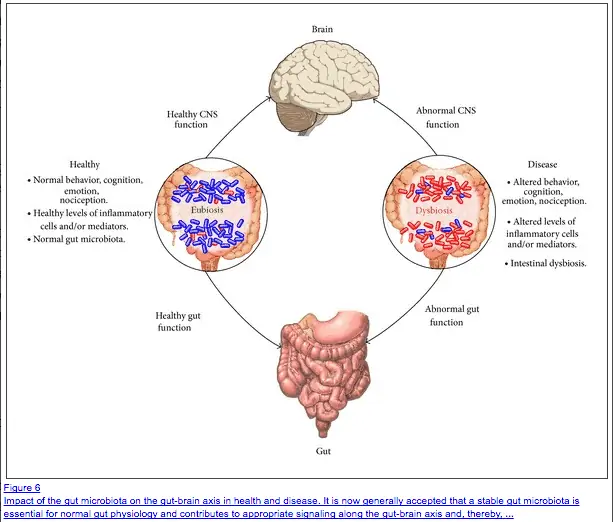
The connection between your brain, GI tract, and the immune system is well established (5).
Anything causing local inflammation (such as bacterial or fungal overgrowth) perpetuates low-grade inflammation in your GI tract.
This inflammation reduces the tight junctions that normally act to protect your body from harmful breakdown products and bacteria.
As this lining is damaged your intestinal start to absorb larger than normal particles (including bacteria) that increase systemic inflammation and alter immune function.
Eventually, your body recognizes these particles as enemies and creates antibodies.
These antibodies often look similar to your own tissues and you get cross-reactivity and boom you now have an autoimmune disease (6).
The underlying theme here is GI dysfunction.
So make sure that you get a complete GI evaluation including advanced stool testing if necessary prior to undergoing the AIP diet.
I’ve seen a dramatic improvement in patients (including autoimmune markers in Hashimoto’s patients) after treating SIBO.
It’s also worth pointing out that patients with thyroid dysfunction are at increased risk for developing SIBO due to the influence of thyroid hormone on the GI tract.
Some studies show that up to 50% of hypothyroid patients have SIBO (7).
So special attention should be given to this group of patients.
AIP & Weight Loss
Another common reason for patients wanting to try the AIP diet is for weight loss.
This is especially true for patients suffering from thyroid autoimmunity like Hashimoto’s.
Why?
Because hypothyroid states create an environment in which it is almost impossible to lose weight (unless you know how to treat it).
So the question many people have is this:
Will using the AIP diet help me lose weight?
To answer this question we need to talk about why it’s difficult for patients with autoimmunity to lose weight.
Many patients believe (and this is true) that inflammation and autoimmunity make weight loss difficult.
While inflammation plays a role, it’s generally NOT the main reason patients can’t lose weight.
As autoimmune disease runs rampant in your body it is triggering inflammation – this much is true.
But what you may not realize is that this inflammation triggers a chain reaction that leads to hormone imbalances such as leptin resistance and insulin resistance.
Much of the weight loss resistance autoimmune patients experience is due to these two conditions.
The problem is that simply changing your diet, or adopting the AIP diet, isn’t enough to REVERSE these hormone imbalances.
It may reduce inflammation in your body, but the hormone imbalances already in existence will remain.
So the AIP diet does help with weight loss in some patients, but it should not be adopted if you are really only interested in weight loss.
You can achieve better results by simply taking the right approach.
You can learn more about my approach to weight loss in this guide.
You can also read more about case studies in which I have used the AIP diet to help patients lose weight here.
Just remember that diet, in general, is really just one component of a comprehensive treatment plan, and you should be making changes to all systems that are out of balance at the same time.
Using AIP for Hashimoto’s Thyroiditis
This brings me to the next topic which is using the AIP diet for Hashimoto’s thyroiditis.
It’s no secret that many patients out there have successfully used the AIP diet to help treat Hashimoto’s – you can find this information with simple google searches.
But is using this diet actually NECESSARY for patients with Hashimoto’s?
And my opinion is that most patients with Hashimoto’s do NOT need to use this diet to get significant improvement.
My recommendation for patients with Hashimoto’s is to take an in-depth look at their current health including all of the following areas: stress levels, how well you are sleeping, your current diet, which nutrients you are deficient in, and your hormone levels.
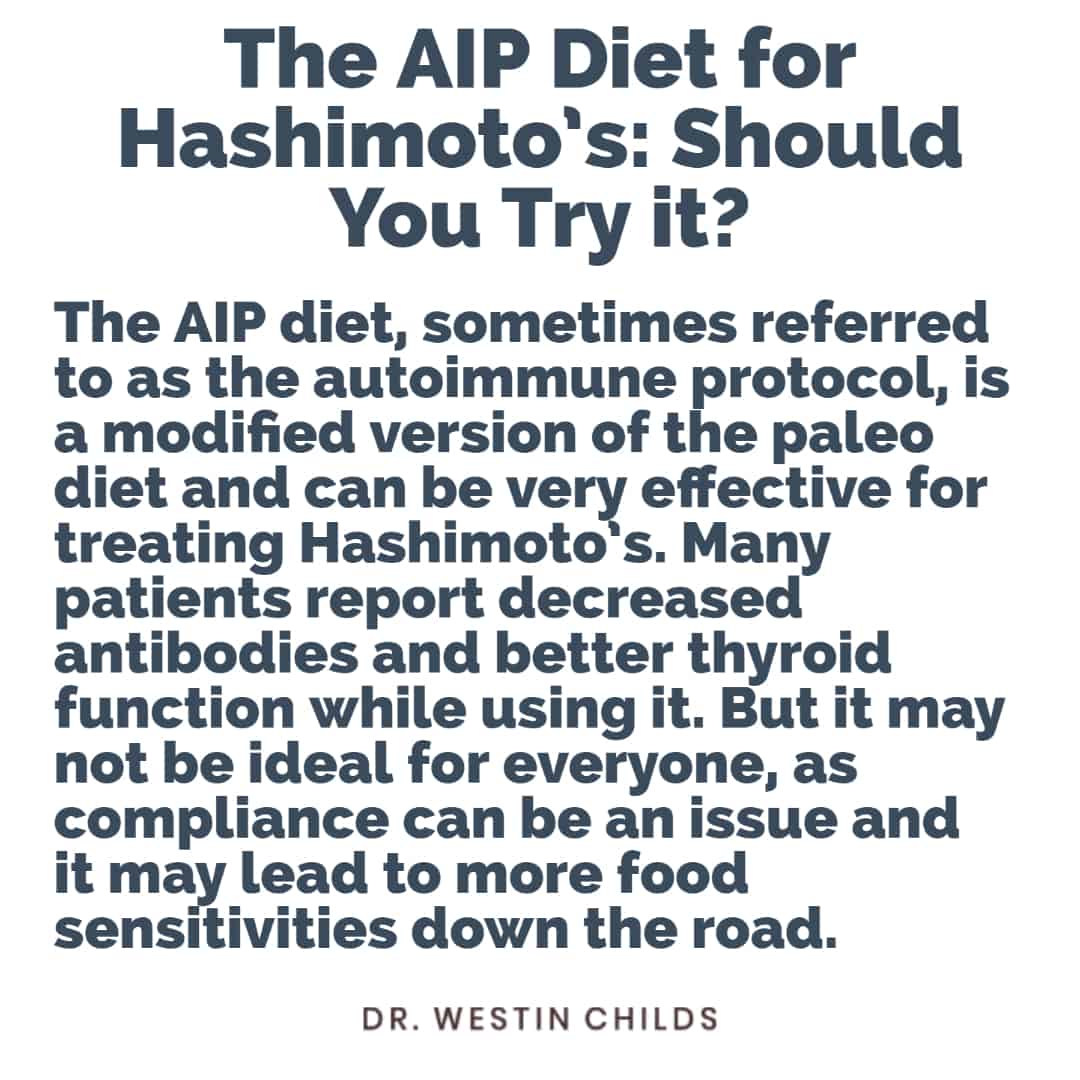
Evaluate these areas in your life and make changes if necessary to them.
In addition, you can check out 5 tips for helping to lower your antibody levels in this post.
I’ve gone into detail about several changes you can make that have been shown to help reduce antibody levels and reduce symptoms.
Using special medications like LDN, testosterone or DHEA can actually improve your immune function.
Do this BEFORE you undergo the AIP diet.
Having said all of this there are some patients who might need to use the AIP diet (or who tend to benefit more than others while using it).
For the majority of patients, you can try all of the recommendations listed in this article FIRST and then go to the AIP diet if necessary.
But if you have a history of severe food intolerances or a history of multiple autoimmune conditions then it may be a good decision to jump straight to the AIP diet.
Who should consider using the AIP Diet
Are there any other patients who should consider using the AIP diet?
Yes, and let’s go over that list.
Patients who should seriously consider using the AIP diet:
- Those with a history of multiple autoimmune diseases (Vitiligo, Hashimoto’s, Type I Diabetes, Lupus, RA, etc.)
- Those with severe or debilitating symptoms (meaning your symptoms are affecting your quality of life)
- Those with multiple food intolerances including moderate to severe reactions (food reactions ranging from neurological to systemic manifestations from food)
- Those people who do not have support from their conventional physician and are unable to find someone local to help guide them (If you lack any options then using the AIP diet may act as a shotgun approach to treating your autoimmune condition)
- Those patients who have tried LDN, testosterone, and other supplements without any benefit (meaning your autoimmune disease is resistant to conventional treatment)
- Those who have seriously cleaned up their diet without any benefit to antibody levels or to their symptoms
As you can tell the list above is certainly relevant to many patients, but probably only represents 5-10% of all patients with autoimmune diseases.
The unifying theme is that patients who are on the more difficult end of the treatment spectrum should consider using the AIP diet.
Those who have only mild symptoms or who have room for improvement in the more basic lifestyle areas are probably better served by using less intensive therapies first.
Who should Avoid it
Just like there are patients who should consider using the AIP diet first and foremost, there are some patients who should probably avoid the diet altogether.
If you fall into these categories below, then you might be better served with a different diet:
- Those more interested in weight loss than managing their autoimmune disease
- Those with multiple hormone imbalances that haven’t been addressed
- Those with special dietary recommendations or those who need to eat certain macromolecules to treat other medical conditions (adrenal fatigue, leptin resistance, etc.)
- Those with mild elevation antibody levels but without significant symptoms (in some cases following your antibody levels may not be the best way to observe the progression of your disease)
- Those with severe metabolic damage (meaning a damaged metabolism – the AIP diet can inadvertently cause caloric restriction which may damage your metabolism further)
- Those who have not tried the basic recommendations listed in this guide
If your disease state is mild or your goal is more oriented toward weight loss then you should focus on those problems first.
I also recommend that you find a physician who is willing to take a comprehensive look at your entire situation prior to undergoing the recommendations listed in this article.
Back to you
The AIP diet is certainly helpful, but like all other diets, it should only be used if absolutely necessary.
When evaluating which diet will be best for your body make sure you take into account your hormones, nutrient deficiencies, and other lifestyle factors.
These things play a significant role in autoimmunity and in your overall health.
While the AIP diet can be effective, there are some situations in which it may actually be harmful.
As a general rule make sure you avoid this diet if you haven’t exhausted all other treatment options.
Now it’s your turn:
Is the AIP diet helping you?
Why or why not?
Are you considering giving it a try?
Leave your comments below!
